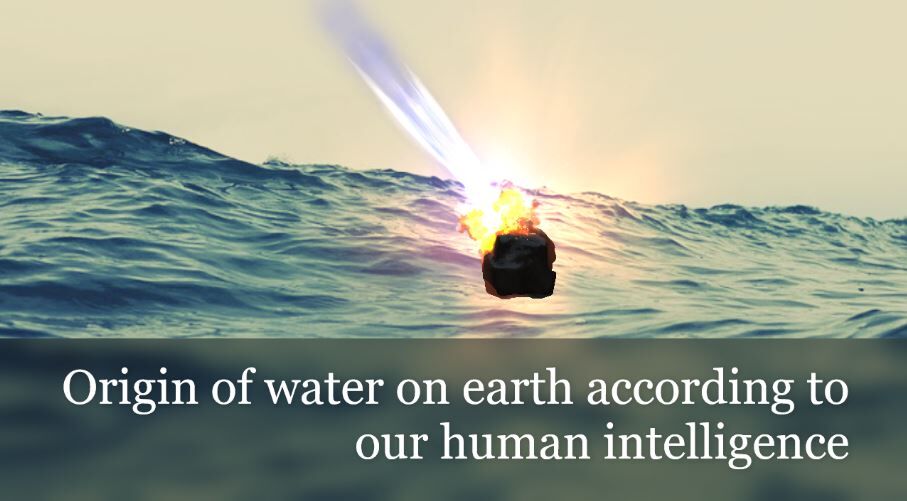Water came to earth from space. Most of our knowledge about the existence and birth of the water itself comes from reading, watching documentaries, and telltales. Some stories pass on to generations. Few think deeply about it to discover that the explanation does not have a strong base unless backed with concrete evidence.
How did water originate on earth?
A proper answer would be; water didn’t originate here. It instead hit the earth in specific ways, as we learned over the years. NASA explains that ‘the water on earth has its origins in the stars.’
Also, there are water molecules in the Nebula even to date and still forming more water than we can think of on earth. The number mentioned was 60 times the water on earth. This amount is something incredible to learn. We also understand that many planets and moons have water in some form or at least the existence of hydrogen.
The Interesting part was the news about Earth-like planets such as the Kepler 22B and Kepler 452b, Kepler 62e & even Kepler62f having water. These planets are portrayed in blue to denote having liquid flowing water like our earth.

Space agencies on the origins of water
NASA is not the only source while researching on this topic. Even ESA (European space agency) has shed light on some brilliant discoveries. One of such is about a Herschel infrared space observatory discovery of water in a comet and the idea that ‘our planet’s seas could once have been giant icebergs floating through space.‘
They are studying various areas on the similar element and other places as usual. Here we are learning about water. It is a treasure for those that want to know more about the origins of water.
Lessons from ISRO’s first mission to the Moon
Information we learn & gather from ISRO is also valuable and plays an essential role in our study on the origins of the water. Through the ISRO, I understand that ‘the key focus of their first mission to the moon was to search for the evidence for water on Moon’. Here’s the snippet of what we get from the explanation. It’s about the water molecules on the lunar surface, i.e. on our very own Moon.
Origin of water as per JAXA
JAXA is short for the Japanese Aerospace Exploration Agency. On learning about the water from JAXA, the golden nugget we get here is “not sure how our earth acquired water”.
They further explain, and their explanation makes sense. JAXA has mentioned the water retained in the asteroid as hydrated minerals and not liquid flowing water.
There’s a clear difference in our understanding of general knowledge about water on earth, which any sound thinking individual can think of and scientific explanations.
Origin of water when looking into the research through various other space agencies such as the Chinese Space Agency and Australia’s Space Agency, we couldn’t get information on this topic and any content through them while searching on this particular topic.
The use of scientific methods brought out the following
Science plays an important role here in figuring out the origins of water. We know scientific methods include investigating, in other words learning from the samples & events that recreate- signs of narrowed-down approach that indicate the existence of a particular event assumption and possibilities gets included too.
For example, Repetition makes one closer to accuracy.
We learn from this study that- the water came from comets, asteroids, and solar nebula (gas and dust) during the formation of the planets.
The tools involved included:
- Sending rovers, satellites, telescopes
- Collecting samples
- Reading the data and interpreting it
- Other various ways.
The origin of water in simple words
The origin of the water is unknown. All we get is it is, and it was present in space. To understand it, One must test as much as one can. The contents of water are analyzed and then compared with the liquid, gases, and solid form (ice) and then come to a conclusion based on the amounts of these contents that the water on earth has in different parts of the world.
It then concludes that the water in the asteroid, comet, particles in the solar nebula & gases match. This outcome indicates that it has come from an event during the formation of our planet. It is a dilemma of whether the earth was formed or while forming.
These theories also raise a question. There is a common thread in research, and it points out that asteroids and comets also hit the other planets as we know. Also, we have planets not far from each other. This finding indicates that they must also have water on them, similar to the earth. Why is there no water in the same form as earth if temperatures at a certain point also match?
One can point at just the right temperature. Another argues the number of asteroids filled with water that hit the earth. We can see many more giant planets in our solar system. Comparing this with our world indicates that one planet formation is quite similar to the others. Since the motion of our (planets) moving in space is also in the same direction considering most highly active magnetic fields that influence huge areas.
Irrespective of the direction of how the sun moves forward if it is, whether clockwise, moving forward, or planets rotate in spirals as they go ahead. A question on gravity also takes seed in our minds. If all the planets are moving at a similar forward motion along with the earth, why is there a difference in gravity on them?
The dilemma of deciding a specific position on its origin
Does this introduce us to why a planet is a gas giant and not the same as earth? Does that mean it got a little less of something or a little more or some other elements?
Just like a dish with no salt and one with salt and spices! They must have been frozen rather than gases being so far away in proximity to the sun.
We can say that the size of the planets would make a difference. However, there are smaller planets as compared to Jupiter. If they are, that means the water is present or must be present in the form of gases too.
The logic of colder and hotter does not entirely fit in place. As farther planets must have all become frozen hard, even in fact become fully covered with the hardened ball of ice since they are smaller.
A border that is a mix of two types of temperatures
We hear that the earth is in a perfect position or golden position, that water doesn’t disappear, and we have all the things needed. We hear this information that anything close to earth must also have water. Water is in the same liquid form and hence has some oxygen. However, our moon doesn’t have water in the same fluid form as we experience on earth.
The second point of view is, If there is water on other planets, our explanation of atmosphere and forming life, forests, etc., takes the centre stage. This point of our understanding tells us that our research of at least the cause doesn’t add up somewhere.
So any source considering water from the beginning or could be instrumental from within itself does not fit the puzzle since the water is already here. It could be the same water we have.
Like how the water gets filtered over the gravels or the natural filtration process, any content could easily get filtered. Having to assume that to be the main point is not adding up.
What about the salt content in this water?
If significant parts of water on earth have salt, why is no salt content considered on the moon? There is Ice on other planets, as per some research. One study explains that salt found in rocks gives us an image of rock salt. Some elements make way for salts to get into the water from the rocks. The following triggers help salts flow into the water:
- Condensation
- Through humans
- Rain
- Floods
- Natural disasters
If the water is freshwater, we know it can accelerate life faster as we see more greenery by the riverside. We learn that the water disappeared from the planets. What about the salt that remains after the water dries up?
Religious scriptures also explain water in various beliefs
Questions that science can answer, but we don’t. Why there is no atmosphere on another planet in our solar system that matches us? No clouds like ours found on earth!
We haven’t reached the outer planets or located a living organism in them. We can only assume based on the experiments conducted on the International Space Station, such as the Japanese Tanpopo mission on a Deinococcus bacteria.
- Why didn’t this process create one massive planet combining all magnetic fields?
- Why do we have only eight planets?
There could’ve been more planets or less than that. We have no answer to these questions. Opinions are always there, but factual information is not available to us. The planets could move away from each other rather than on the proper axis and move together in uniformity.
The answer we may get is the criteria to identify planets from non-planets. It doesn’t answer the question. It is at this is a stage where we lack. No such guide in science indicates the specific number of planets only in any solar system.
Does earth produce the water we consume?
In other words, does our earth make its water? We learn that it circulates & re-circulates the water that it already has in different forms. The atmosphere around our planet is like a greenhouse. In other words, like an invisible blanket that traps the water and due to the constant degrees to temperature variations within that blanket, the water also doesn’t dry out due to excessive heat. Nor does all the water on earth freeze due to extreme cold.
The elements found within the earth, such as deuterium and hydrogen, have plenty of O2, which it needs to create water. So, we see that the water we have is aplenty. Even we, human beings, have learned to transform gases into water.
For instance, when in a sea on a ship or a desert area, digging a hole, stuffing green plants, and covering it with a plastic sheet produces water droplets, and those are freshwater. Even saltwater in a container covered with plastic cover gets droplets covered in a few hours, and it is freshwater. Hence, a mini example of the water cycle.
These survival hacks are a minor form of understanding on this topic. The water came to earth initially in vast amounts through any of the conditions discussed by the scientists and researchers. We don’t see the event happening at present.
It seems we have an ample amount of water required for humans to survive on earth as if the water is in exact measure to support life on earth.
Is the water on earth going to disappear?
We are losing water on earth in a specific manner. Climate change also plays an instrumental part in the phenomenon we are facing.
Also, one explanation unleashes another hypothesis that life may have existed on other planets since we found a presence of phosphine on other planets. The conclusion that phosphine produced by the microorganisms living in the earth’s oxygen-starved environments is already present.
Can we consider places in the deep space with plenty of water and the ideal weather condition for humans to survive?
We live life as mortals on this earth, where the two subjects intersect. Science or scientific studies have not explained it in-depth due to the light and space, the area we can’t comprehend (a topic very much connected to metaphysics).
Talking on this subject leads us to the most familiar studies, Planet mars!
Where exactly was water before gases or dust?
One more question pops up in my mind: “where exactly this water was before gases or dust?”. For sure, there has to be a place where it turned into gases. Also, these asteroids or comets have water, but how did the water get into it in the first place?
Also, that is so many asteroids hit the earth. It certainly must’ve hit other planets, too, such as Mars. Mars is smaller than earth. That means also given the number of asteroids that hit that planet could’ve flooded the whole surface even more than earth.
Also, the right amount of carbon content on the planet could’ve helped life. As we learn on mars, the average temperature is approx- 81 degrees Fahrenheit, which is -62.7778 degrees Celsius. Warmer than the coldest habitable place on earth in Russia is Oymyakon. The lowest temperatures recorded there have been -67.7 degrees Celsius. It is more or less the same at certain times.
The theory on the origin of water is not entirely accurate
If the gases and the dust combined when the earth formed, we know there is already a theory in place. The popular viewpoint is that our planet was hot & molten lava and was already there.
Another idea pops up in one’s mind. If the entire earth was hot, the water could have quickly evaporated. It makes sense that asteroids and comets have water in them due to it simply being in the space rolling around gathering dust and becoming a ball of dust and stiff due to it turning into Ice or as hard as a rock due to heat.
A dry, hot surface of complete inner & outer core can’t have moisture. Assuming the temperature would not be the same due to evaporation. However, there needs to be a covering or a blanket for the temperature to remain the same. One can mention porous surface and water being trapped in it just as the sponge’s pores appear.
After the solidification of the earth, why not consider the moisture from the gases in the first place? The magnetic field attracts things close to it, and the atmosphere traps.
Let’s consider it that way. If this would be the case, why are most scientists warning about the drying up of water when we have a fully formed atmosphere, unlike during the earth’s formation.
Conclusion of our research so far on the origin of water on earth
We can conclude that we are close to the conclusion on the origin of the water. However, the explanation at present doesn’t entirely fit in place. Although it may seem like an infinite regress, it isn’t if we can consider the unseen elements. We in science keep on improving ourselves by learning, understanding, observing, reacting, and even projecting based on our observations. The same is the case of specific explanations on certain types of research. The collective intelligence of the intellectuals in this field gives a broader picture and helps narrow down the possibilities.

